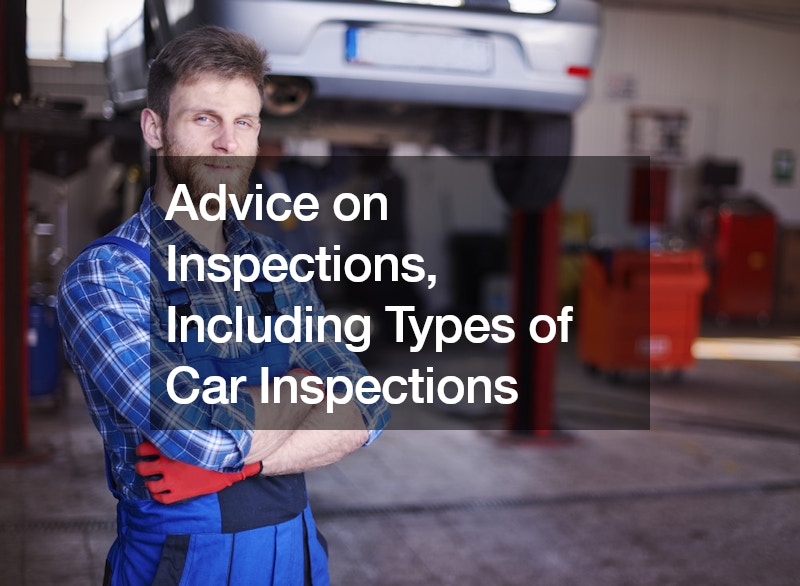

When it comes to maintaining your vehicle, regular inspections are a crucial aspect of keeping your car safe and road-worthy. In this comprehensive guide, we will delve into the different kinds of car inspections, why they are important, and how to prepare for them.
1. What Are the Types of Car Inspections?
There are various types of car inspections that serve different purposes, from safety checks to emissions testing. Car inspections can be categorized into several types, each serving a specific purpose. Safety inspections are conducted to ensure that your vehicle meets the required safety standards. Emissions inspections, on the other hand, focus on checking the level of pollutants emitted by your car. Pre-purchase inspections are crucial when buying a used car to uncover any underlying issues. Maintenance inspections help in identifying potential problems before they escalate. Insurance inspections are required by auto insurance agencies to verify the condition of the vehicle. Lastly, roadworthiness inspections are necessary to ensure that the vehicle is fit for driving.
When it comes to safety inspections, certified mechanics or authorized inspection stations typically conduct a thorough examination of the vehicle’s brakes, tires, lights, and other essential components. Emissions inspections involve checking the exhaust system and emissions control devices to meet environmental standards. Pre-purchase inspections can reveal hidden issues that may not be apparent to the untrained eye. Maintenance inspections are essential for keeping your vehicle in optimal condition and preventing costly auto repair down the road. You may also want to consider getting your windshield checked in case you are in need of a crack or rock chip repair. In some states, driving with a windshield cracked is even illegal.
Insurance inspections are necessary to determine the insurability of a vehicle and prevent fraud. Roadworthiness inspections focus on ensuring that the vehicle is safe to drive on public roads. No matter the type of car inspection, it is essential to stay proactive and address any issues promptly to maintain the longevity and performance of your vehicle.
2. Why Is It Important to Have Regular Inspections?

Regular car inspections are crucial for several reasons. Firstly, safety concerns cannot be overlooked, as a faulty vehicle can put you and others at risk on the road. Legal requirements mandate periodic inspections to ensure that vehicles meet certain standards. Preventive maintenance through inspections can help identify and address potential issues before they escalate into major problems.
When it comes to resale value, a well-maintained vehicle with a documented inspection history commands a higher price in the used car market. Auto injury attorneys often recommend maintaining regular car inspections to mitigate the risk of accidents due to mechanical failures. Auto check engine light inspections can help diagnose and address issues that trigger warning lights, preventing more significant damage down the line.
Furthermore, insurance agencies may require inspections to determine the coverage premiums based on the condition of the vehicle. Environmental impact is also a significant factor, as emissions testing helps reduce air pollution and minimize the carbon footprint of vehicles on the road. All types of car inspections are necessary.
3. How Often Should You Have Your Vehicle Inspected?
The frequency of car inspections may vary depending on the type of inspection and the specific requirements in your region. Generally, annual inspections are recommended to ensure that your vehicle maintains its safety and roadworthiness. Bi-annual inspections may be necessary in some areas to comply with emissions standards and safety regulations. If you’ve recently been in a crash, you should also consider auto collision repair inspections more frequently, as damaged cars may often have more issues.
Mileage-based inspections are common for commercial vehicles or high-mileage cars that require more frequent checks due to wear and tear. After accidents or breakdowns, it is essential to have your vehicle inspected to assess any damages and ensure it is safe to operate. Before embarking on long road trips, a thorough inspection is recommended to prevent any unforeseen issues while on the road.
After modifications or repairs, it is crucial to have your vehicle inspected to verify that the work was done correctly and does not compromise safety. Different types of car inspections may be necessary for each individual case.
4. Who Can Perform Car Inspections?

Car inspections can be carried out by various entities, including certified mechanics who have the expertise to assess the condition of your vehicle accurately. Authorized inspection stations or dealerships are also capable of conducting thorough inspections and providing certification for compliance with regulations.
For added convenience, mobile inspectors can perform on-site inspections at your location, saving you time and hassle. Specialty inspection services may offer more in-depth evaluations, especially for unique or customized vehicles. Alternatively, DIY inspections can be done by vehicle owners who have the knowledge and tools to conduct basic checks on their cars.
Regardless of who performs the inspection, it is crucial to ensure that the inspection is conducted thoroughly and accurately to identify any potential issues and address them promptly. Choosing the right inspector or service can make a significant difference in maintaining the safety and performance of your vehicle. A mechanic will guide you through the types of car inspections that are necessary.
5. What Should You Expect During a Car Inspection?
During the different types of car inspections, you can expect a series of checks and tests to determine the condition and safety of your vehicle. A visual inspection involves examining the exterior and interior of the car for any visible defects or wear. Functional tests assess the performance of essential systems such as brakes, lights, and steering.
Diagnostic scans may be carried out to detect any underlying issues with the engine or other components that may not be visible to the naked eye. Documentation and reports are typically provided after the inspection, detailing the findings and any recommendations for repairs or maintenance. Certification or approval stamps may be affixed to indicate that the vehicle has passed the inspection and is safe to operate.
Recommendations for repairs are often included in the inspection report, outlining any necessary actions to address identified issues. By understanding what to expect during a car inspection, you can be better prepared to ensure that your vehicle remains in optimal condition and complies with safety standards.
6. How Much Does a Car Inspection Cost?
Cost varies across all types of car inspections. Other factors include the complexity of the assessment, and the location of the service provider. On average, inspection costs range from a few dozen to a few hundred dollars, with emissions testing typically on the lower end of the spectrum.
Factors affecting inspection costs include the age and condition of the vehicle, the expertise of the inspector, and any additional services included in the inspection package. Discounts or promotions may be available from time to time, offering savings on inspection services for budget-conscious consumers.
When considering the cost of a car inspection, it is essential to prioritize the quality of the service over the price. Opting for a thorough and reliable inspection may save you money in the long run by preventing costly repairs or accidents due to overlooked issues. By investing in regular inspections, you can ensure the longevity and performance of your vehicle while maintaining safety on the road.
7. What Happens if Your Vehicle Fails Inspection?

If your vehicle fails inspection, it means that there are defects or issues that need to be addressed before the vehicle can be deemed roadworthy. Defects and failures identified during the inspection may range from minor issues such as a broken taillight to more severe problems like brake failure.
Repair recommendations will be provided to outline the necessary steps to rectify the identified issues. Retesting procedures will vary depending on the inspector or service provider but typically involve verifying that the repairs have been completed satisfactorily. Legal consequences may arise if you fail to address the defects promptly and continue to drive the vehicle without passing inspection.
Grace periods for repairs may be granted in certain cases, allowing you a specified time to rectify the issues before facing penalties or fines. Appeals or disputes processes may also be available if you believe the inspection results were inaccurate or unfair. By addressing any failed inspection findings promptly, you can ensure that your vehicle remains safe and compliant with regulations.
8. Can You Drive Your Car Without Passing Inspection?
Driving your car without passing the required types of car inspections can pose significant risks and consequences that should not be taken lightly. Consequences of driving without passing inspection include potential fines, penalties, or even the suspension of your driver’s license. Furthermore, insurance coverage issues may arise if your vehicle is not in compliance with safety and emissions standards.
Penalties for non-compliance vary by jurisdiction but can include fines, vehicle impoundment, or even court appearances for repeat offenders. Risks of mechanical failures due to driving an uninspected vehicle are also a concern, as neglected issues can escalate into more significant problems while on the road.
Legal liabilities in accidents are another consideration, as driving an uninspected vehicle may result in legal repercussions if an accident occurs due to a preventable mechanical failure. Safety concerns for all road users should be prioritized, and compliance with inspection requirements is essential to ensure the safety and well-being of everyone on the road.
9. Are There Any Exemptions or Waivers for Inspections?
Some vehicles may be eligible for exemptions or waivers from requirements on some types of car inspections. Older vehicles may be exempt from inspections if they meet specific age criteria and are deemed roadworthy based on their condition. Classic or antique cars may also qualify for exemptions if they are well-maintained and used primarily for display purposes.
Low annual mileage exemptions may be granted for vehicles that are driven infrequently and pose lower risks to road safety. Temporary non-use waivers can be obtained for vehicles that are not in operation for an extended period, such as during storage or restoration. Hybrid or electric vehicles may receive incentives or alternative compliance options to encourage environmentally friendly transportation.
By understanding the exemptions and waivers available in your region, you can determine if your vehicle qualifies for any special considerations regarding inspection requirements. It is essential to stay informed about the regulations and guidelines to ensure that your vehicle remains compliant with safety and emissions standards.
10. Tips for Preparing Your Vehicle for Inspection

Prior to taking your vehicle for inspection, there are several steps you can take to prepare and ensure a smooth and successful assessment. Regular maintenance checks, such as oil changes and fluid top-ups, can help keep your vehicle in top condition and reduce the likelihood of failing inspection. Cleaning and organizing the interior of your car can make it easier for inspectors to access critical components during the inspection.
Checking exterior lights and signals for functionality is essential to ensure that your vehicle is visible and safe on the road. Testing brakes and tires for proper condition and inflation levels can help prevent accidents due to faulty components. Making necessary repairs in advance, such as brake repair, can improve your chances of passing inspection without any issues. New tires could also never hurt!
Keeping records and documents handy, such as maintenance logs and repair receipts, can provide valuable information to inspectors and demonstrate your commitment to maintaining your vehicle. By following these tips and staying proactive about vehicle maintenance, you can increase the likelihood of passing inspection and ensure that your car remains safe and compliant with regulations.
In conclusion, car inspections are an essential aspect of vehicle maintenance that should not be overlooked. By understanding the different types of car inspections, why they are important, and how to prepare for them, you can ensure that your vehicle remains safe, roadworthy, and compliant with regulations. Whether it’s for safety, legal, or environmental reasons, regular car inspections play a vital role in keeping you and others safe on the road.
After you have regular car inspections, don’t forget to make your car your own with customizations! For example, consider a vehicle ceramic coating service, an audio system installation, or even a car wrap. While inspections are important and vital, it’s important to make your car your own, too!



